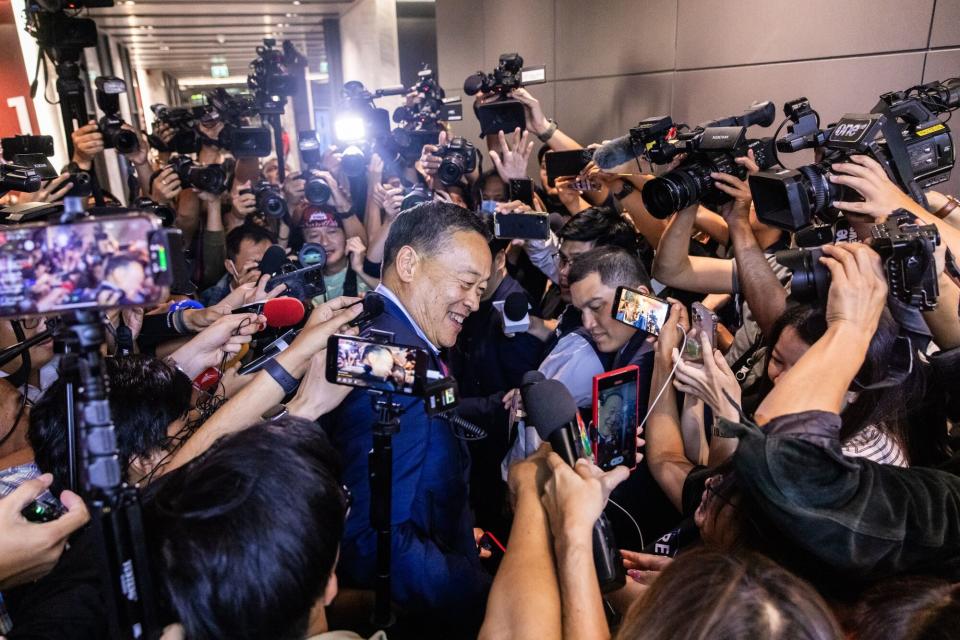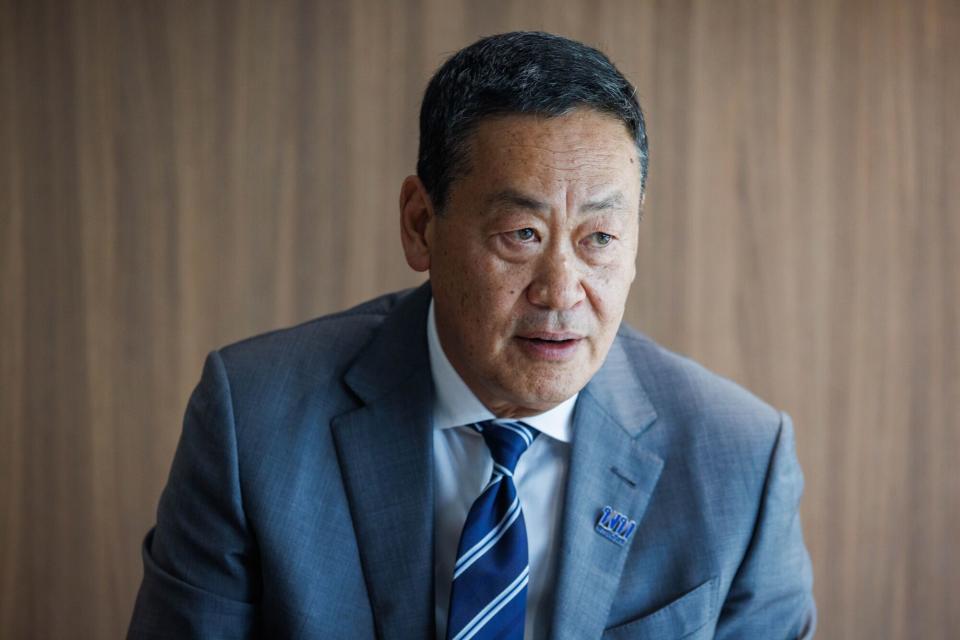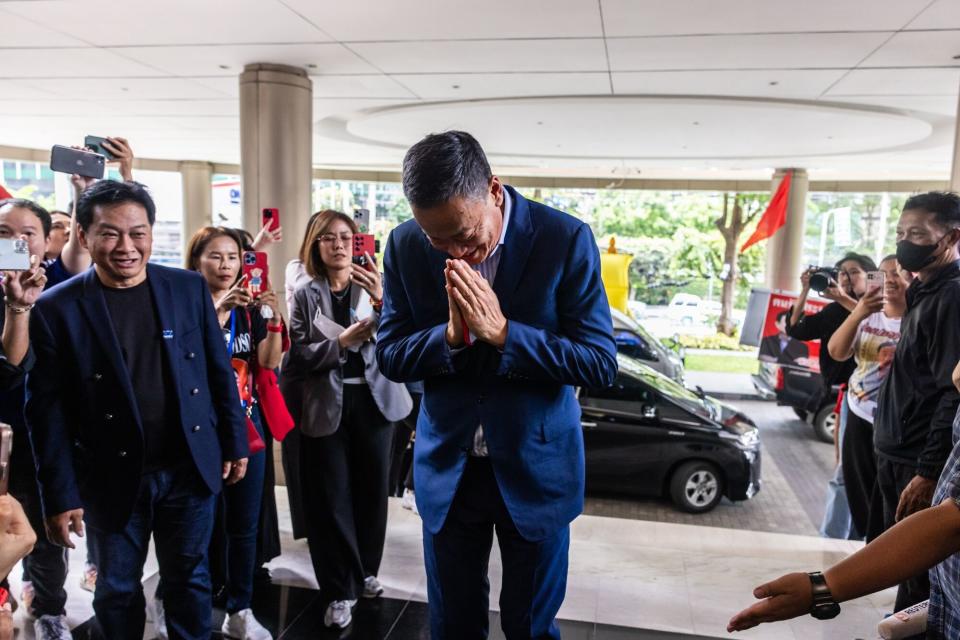Thaksin Ally Srettha Elected as New Thai PM, Ending Three-Month Political Impasse
(Bloomberg) -- Some three months after an election that represented one of the biggest challenges to Thailand’s royal establishment in years, the country finally has a new prime minister — and it’s someone who has the support of forces aligned with the palace.
Most Read from Bloomberg
Wagner Chief Prigozhin Listed Aboard Crashed Jet, Reports Say
Huawei Is Building a Secret Network for Chips, Trade Group Warns
Musk Told Pentagon He Spoke to Putin Directly, New Yorker Says
Goldman Is Cracking Down on Employees That Aren't in Office Five Days a Week
Srettha Thavisin, a former property tycoon, became the first new leader to take charge of Thailand since 2014, when former army chief Prayuth Chan-Ocha staged a coup. Srettha, 61, won 482 votes in a joint sitting of the parliament’s two chambers with 747 lawmakers on Tuesday. He was backed by 152 members of the military-appointed Senate in addition to his bloc’s 314 elected lawmakers and some others.
Srettha can form his cabinet once his appointment is endorsed by King Maha Vajiralongkorn in a Royal Gazette.
@patpichatan has the details https://t.co/X9kjpUn21d pic.twitter.com/dkT84mEcKp
— Bloomberg Quicktake (@Quicktake) August 22, 2023
The vote came hours after Thaksin Shinawatra, the former premier who effectively helms Srettha’s Pheu Thai party, returned to Thailand for the first time in 15 years as part of a deal with a military establishment that has repeatedly ousted his political allies over the past two decades. Pheu Thai had finished second to the upstart Move Forward party, which had pushed for changes to a law that restricts criticism of the nation’s powerful monarchy.
The agreement between the former enemies effectively shut the door on Move Forward party’s chances of taking power. Pita Limjaroenrat, the party’s 42-year-old Harvard-educated leader, had vowed to press ahead with amendments to the lese majeste law — a stance that prompted senators to deny him the premiership.
Thailand’s currency and stocks rallied on the news of Srettha’s election. The benchmark stock index jumped 1.3%, the biggest one-day gain since July 14, while the baht rose as much as 0.7%, the most in almost a month.
After landing in Thailand on Tuesday, Thaksin bowed before a portrait of the monarch to show his loyalty before being taken to prison to serve jail sentences for various cases stemming from his time as prime minister, which ended with a coup in 2006. He’s expected to receive a royal pardon at some point.
Red-clad supporters of Pheu Thai, who had thronged the airport to welcome back Thaksin, also celebrated Srettha’s win at the party headquarters in central Bangkok.
In the meantime, Srettha will look to move ahead with forming a cabinet among an 11-party alliance. His immediate challegne is to revive growth in Southeast Asia’s second-largest economy, which is among the nations growing at the slowest pace in the region. Investors, who have fled Thailand’s stocks since the May election, will be watching if Srettha follows through with his coalition’s promise to fire up the economy with cash handouts and a dose of fiscal stimulus.
“The new government will be positive for the economy,” said Amonthep Chawla, head of research at CIMB Thai Bank Pcl in Bangkok. “It will help improve sentiment and spur economic activities” through stimulus measures, he said.
Srettha is a three-decade veteran in the real estate industry with an MBA from Claremont Graduate School in the US. He joined Pheu Thai earlier this year, first taking the role of being the chief adviser to Thaksin’s daughter Paetongtarn Shinawatra before being named as one of the three premier candidates.
An avid soccer player and a fan of Liverpool FC in the English Premier League, Srettha led Bangkok-based Sansiri Pcl for decades before resigning as president and chief executive in April.
In an interview with Bloomberg earlier this year, Srettha said he wants to stimulate the economy that’s lagging the growth of its neighbors and bridge the gap between the rich and the poor. He was the one to unveil Pheu Thai’s “digital wallet” scheme that would give every Thai who is 16 years old and above 10,000 baht each.
The new prime minister will also have to follow through with Pheu Thai’s campaign pledges such as a 70% hike in minimum wage, household income guarantee of 20,000 baht per month and tripling of farm profits to lift economic growth to 5%.
The lion’s share of the giveaways promised by Pheu Thai may not get implemented until the fourth quarter of 2024 as there’s limited room to adjust pre-set budget parameters for fiscal starting Oct. 1, said Tamara Mast Henderson of Bloomberg Economics. Still, the coalition’s plan to ramp up fiscal support will likely reinforce the Bank of Thailand’s resolve to increase the policy rate again on Sept. 27.
Data Monday showed gross domestic product grew 1.8% in the second quarter, missing analysts estimate for a 3% growth and prompting authorities to slash the 2023 forecast to a range of 2.5% to 3% from 2.7%-3.7% seen previously.
The $500 billion trade- and tourism-reliant economy faces headwinds from a slowdown in China, which has hurt Thai exports, and also a slow return of Chinese tourists.
--With assistance from Pathom Sangwongwanich and Lee Miller.
(Updates with details on cabinet in third paragraph. A previous version of this story corrected Srettha’s age.)
Most Read from Bloomberg Businessweek
Drug Benefit Firms Devise New Fees That Go to Them, Not Clients
Never Mind Shrinking Households, Builders Are Adding Bedrooms
‘Don’t You Remember Me?’ The Crypto Hell on the Other Side of a Spam Text
GOP Presidential Hopeful Ramaswamy Sued Over Strive’s Practices
©2023 Bloomberg L.P.





